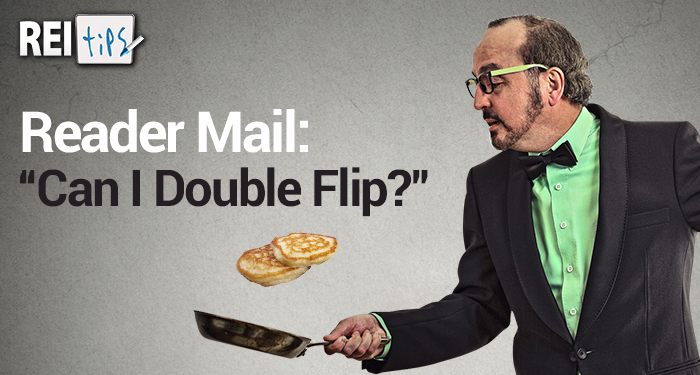Yay, it’s reader mail time!
Today we’re taking on a nagging question I actually hear a lot of noobs ask about the possibility of flipping houses that other investors already have under contract…
From: JACQUELINE BROWN
To: ** REI Tips **
Subject: I have a QuestionHi, Thanks so much for your very informative website, It’s a Great Resource for me, I’m new at Learning how to invest in properties, and I’m really so excited to get started, there is so much for me to learn, but I’m so willing. I do have a question. I found a property at a low price, but I really think this property is being sold by another real estate investor, could I actually put the property under contract, and flip the property to another investor? Any help would be Greatly Appreciated. Thank You.
Sincerely,
Jacqui
Hi, Jacqui! First, thanks so much for your kind words! You got me all warm and fuzzy inside.
Now I assume when you say “I really think this property is being sold by another real estate investor”, you mean whoever first presented the deal to you may not be the owner, but rather a wholesaler with a pending purchase contract (or option) for the property. (If not, correct me.)
Great question! And the short answer is, yes, it is surely possible for you to also put another purchase contract (or option) in place, then flip it to another investor. Think of it as a “double flip”, and it actually happens more often than you think.
Your question actually reminds me of how my friend Bill (who flips houses in Vegas) stumbled upon a creative way to profit from this very tactic one day when he was trying to drum up a buyer for one of his deals.
Bill’s Buyer’s List “Roulette”
(Get it? Cause he flips houses in Vegas… 😉 )
One day with a particular house under contract, Bill started at the top of his buyers list making calls to try and quick flip it. After pitching his deal to each of them, he then had the bright idea of asking them just one more little question before letting them get off the phone:
“Hey before you go, do you have any other houses you’re trying to sell right now?”
As you might imagine, a number of them did. So then Bill asked,
“Soooooo… If I can find someone to buy that thing from you, would you mind giving me a piece of the action?”
To which almost every one of them said, “Uh……YEAH!”. Whether by adding a little extra icing to the top or just sharing some of the profit they’d already built into the deal, they were more than happy to go splits with Bill if he could help them liquidate it sooner rather than later. More often than not, you’ll find this to be the case.
So he took careful notes on each and every deal his guys needed to expedite. Then once he made his way through his entire buyers list, he started right back at the top and called each one of them again, this time describing the array of deals his colleagues had share with him to see if anyone had any interest.
Lo and behold, Bill flipped a couple of those houses that day, and added a few extra thousand to that month’s bottom line! Bill’s “Buyer’s List Roulette” was born.
How This Relates to Your Question…
From there, alls Bill had to do next was go secure an “equitable interest” in the property real quick by putting a contract in place between himself (as buyer) and the investor (seller). Then another contract to sell to his end buyer. So it looks a little like this:
- Joe Owner “A” (Current property owner of record)
- Jane Investor “B” (one of Bill’s buyers, and has a contract to purchase from Joe “A”)
- Bill Investor “C” (contracts to purchase from Jane “B”)
- Gertrude Investor “D” (Also on Bill’s buyers list, and contracted to buy this deal as the end-buyer from Bill “C”)
Now even though investors “B” and “C” don’t actually own the house yet – they’re also wholesalers and just have a contract on the house – Bill (“C”) and Gertrude (“D”) can still contract to purchase with non-owner investors. So long as the closings happen in the proper order and the deed and money “flow” properly, all these closings can happen on the same day or “simultaneously”.
And a big part of the reason this all can work is because the “equitable interest” you have when you secure a purchase contract, gives you the legal right to market and/or contract to sell that property, so long as you don’t actually sell it before you own it.
So with the specific house you’re asking about, just make sure the numbers still make sense for a possible “double flip”, hedge your risk as best you can, and personally I say make sure your investor knows you’re also planning to wholesale the deal.
If all that’s in order, t I say “double flip” to your heart’s content!
Hope that helps, Jacqui! Anyone else have any thoughts on this? Leave ’em in the comment below…







Great post JP!!! We market other investors deals to “fill the gap” between our own deals which makes us an extra cash each month with no advertising costs. We typically assign our buyer to the wholesaler for our fee and eliminate the triple escrow. If the buyer is a landlord looking for a buy and hold than double and triple escrows are OK, but if you’re selling to a fix & flip investors the multiple flips will make it difficult for the end user to obtain a loan in this market.
Great input – thanks, Terry!
Excellent Post! I’ve heard of ”the list” theory, and while I have yet to sit down and methodically call my list, I Definitely am a proponent of partnering up with other investors. In fact, the last 2 deals that I’ve done have involved a split in profits with another investor that either brought a deal or a buyer to the table.
Great article as always JP! You rock young man! One question though and I hope you can elaborate on this or make a video on how exactly one can execute a “double flip”. The “double-flip” technique sounds alot like the “flex option”. Is that what we’re talking about here, only under a different name? Also, when you mention “a big part of the reason this all can work is because the “equitable interest” you have when you secure a purchase contract”, do you mean paying the original wholesaler a fee to market the deal? Any clarification would be beyond helpful JP, please and thank you. Happy Holidays!!
I loved the article but I work as a bird dog. Instead of doing and AB, BC I just charge a flat fee to get the property moved. I find the investor for the wholesaler and the investor pays me a fee. It’s not a lot but my business is just getting started and I have a background as a recruiter so I use what I know to find buyers. I’m in my comfort zone. When I make enough then I will start purchasing my own foreclosures. I want to do rentals.
Hector,
You have equitable interest when you put a purchase contract on a property. That’s because you are stating “to the world” you plan to buy it (meaning you now have a legal interest in that property). If you don’t have equitable interest first & bring a buyer, you would be brokering without a license.
Hope that helps,
Jay von Mohr
818-359-1617
Ahhh!! I see. Makes perfect sense now, thanks Jay. But still, is this article talking about “flex options” or is this “double flip” technique a whole different animal?
Great post JP!